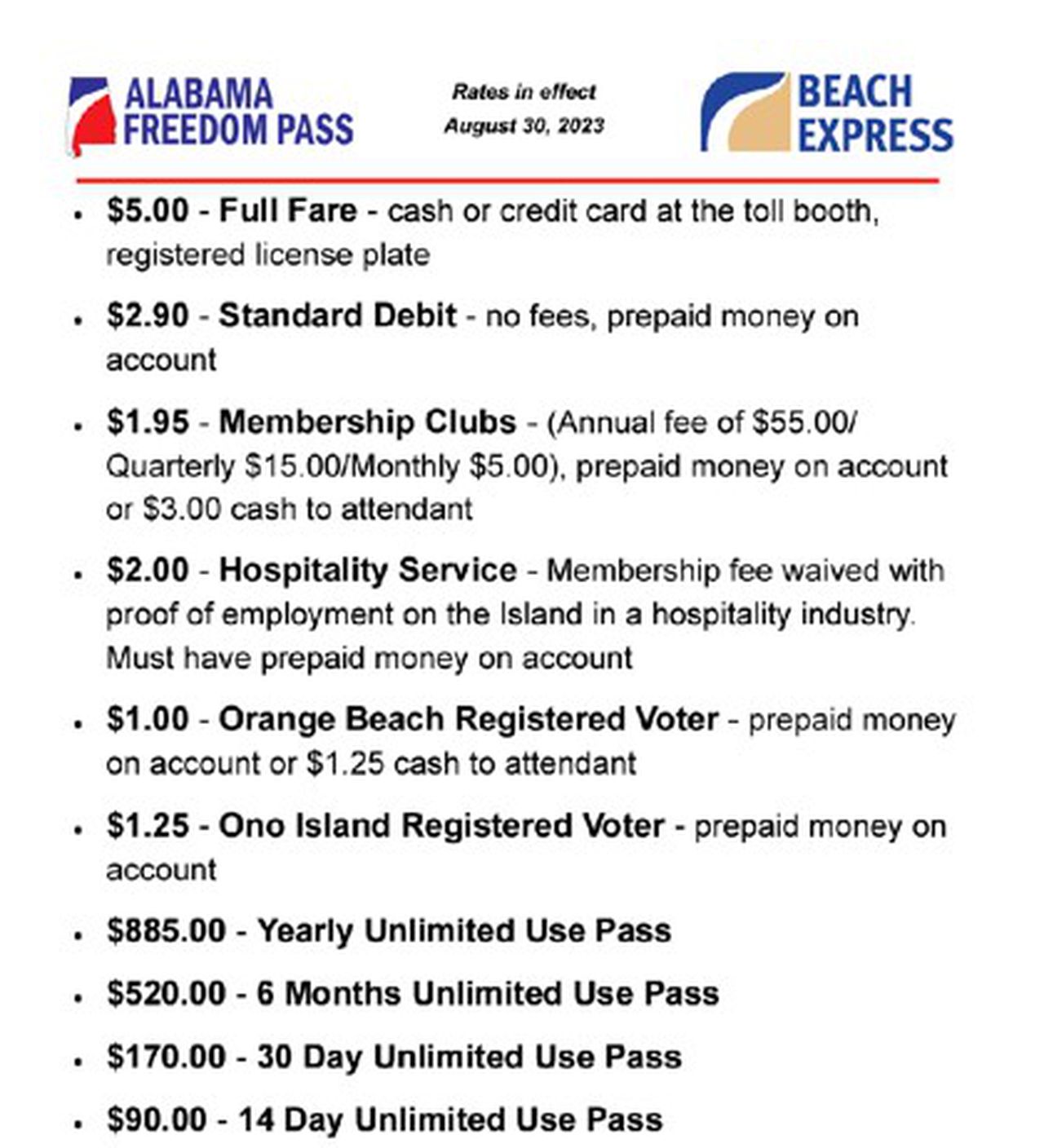Orange Beach toll bridge owner nearly doubles rate after Supreme Court ruling, blames ALDOT
The owners of a toll bridge in Orange Beach are nearly doubling the rate to drive onto the structure, and are blaming the director of the state’s transportation agency for attempting to destroy the company.
The rate hike comes less than one week after the Alabama State Supreme Court ruled against the Baldwin County Bridge Company’s lawsuit against Alabama Department of Transportation Director John Cooper over what they claimed were negotiations held in “bad faith.” The Supreme Court’s ruling overturned a lower court’s decision to issue a preliminary injunction against a state bridge project in Gulf Shores. The ruling allows the project restart soon.
BCBC, in its statement, blamed the ALDOT director mostly for the rate increase, which comes ahead of a busy Labor Day travel weekend. An ALDOT spokesman was not immediately available for comment.
According to the statement, “BCBC had proposed to build a new span and provide a four-lane bridge for the citizens of Baldwin County to use for free, but (Cooper) refused to even consider that proposal. Now, as a result of the actions taken by Director Cooper, BCBC has been forced to increase the toll rates on the Beach Express Bridge.”
BCBC has owned and operated the two-lane Beach Express (BEX) Bridge adjacent to The Wharf since 2000.
The increase for cash/debit card rate is from $2.75 per trip to $5. Electronic rates for prepaid account holders — which are the rates paid by many South Baldwin County residents, will rise by 20 cents to an average of $2.22. The discounted electronic rate for Orange Beach residents will not be increased and will remain flat at $1.
The following are the new rates for using the Beach Express Bridge in Orange Beach effective August 30, 2023. (courtesy of Baldwin County Bridge Company)
BCBC, in its statement, said it has not increased the toll rate for 13 years, since 2010. The company also claims it has had to “weather increasing costs because of national economic headwinds and inflation.”
“We’ve done everything we can to be a good neighbor, keep our tolls low, and provide safe and efficient travel options for drivers in Coastal Alabama,” the statement says. “We’ve also taken pride in the fact that our business provides jobs for dozens of Alabama residents who provide excellent service to our customers.”
The statement continues, “But BCBC has also faced a challenge no business in this State should ever have to face: An unelected bureaucrat has decided to do everything in his power to put BCBC out of business. For years, ALDOT Director John Cooper has been on a personal mission to destroy our company.”
The statement is similar to a comment from BCBC president Neal Belitsky on Friday, who said the Supreme Court’s decision “sends an unfortunate message to businesses across this nation — come to Alabama on notice that anything an unelected government official chooses to do to you, he can do and you are powerless to stop him even if he is acting in bad faith.”
The Alabama Supreme Court, in its ruling, pointed to the 122-year-old State Constitution for giving Cooper “absolute immunity” from being sued in his official capacity as a state agency director.
The company claims Cooper pursued a new two-lane bridge project in Gulf Shores — approximately 1.1 miles west of the toll bridge and over the Intracoastal Waterway — to put the company “out of business” and “take away our property.” Cooper approached BCBC about the state purchasing the bridge shortly after he took over as director in 2011.
BCBC has long argued that Cooper acted in “bad faith” during negotiations with them ahead of rewarding a contract to the Scott Bridge Co. for the Gulf Shores project. Cooper, during testimony in a Montgomery courtroom in May, said BCBC’s alternative proposal was as a “useless as a screen door on a submarine.”
BCBC, about one year ago, pushed for Cooper to consider an alternative proposal that would have prohibited new bridge construction for about 50 years, but also included waiving toll fees for county residents. After Cooper rejected their proposal, the company sued the director in his official capacity as ALDOT’s director.
“BCBC has been forced to spend a substantial amount of money to defend itself in court from Director Cooper’s conduct, and it now appears that Director Cooper will be allowed to carry out his plan to destroy BCBC’s business and try to bankrupt our company.”
The statement continues, “The years of litigation, uncertainty, bad faith negotiations, and direct pressure put on our company by Director Cooper has negatively impacted our business. Despite the hostile business environment that Director Cooper created for us, we’re still working hard to keep costs low and limit toll increases as much as possible going forward.”
Belitsky, also on Friday, vowed to continue pursuing an inverse condemnation claim against ALDOT, which the Supreme Court ruling does not prevent. That claim is expected to go before a Montgomery County court later this fall, and could provide a financial remedy to BCBC for valuation damages to its toll bridge with the construction of the new bridge in Gulf Shores.
Alabama Gov. Kay Ivey, during a visit to Point Clear Monday, said she hopes the “courts stay in their lane” when it comes to the infrastructure issue.
“I’m real proud government in Alabama can get back to building roads and bridges,” Ivey added. “And the courts can stay in their lane.”
When asked if she believes the courts will continue to “stay in their lane,” she responded, “I sure do.”
